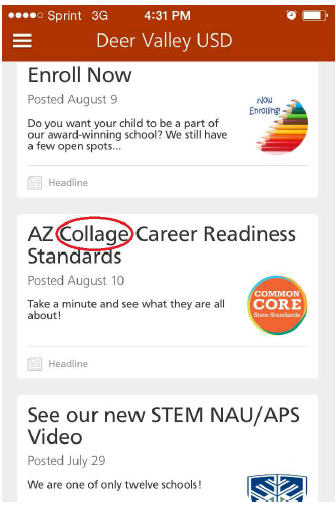This picture was sent to me by one of my blog readers. I thought it was appropriate to share today. I’m guessing they were spelling phonetically. Have a good Halloween, don’t eat too much candy, and please be safe out there!

This picture was sent to me by one of my blog readers. I thought it was appropriate to share today. I’m guessing they were spelling phonetically. Have a good Halloween, don’t eat too much candy, and please be safe out there!

This one comes from Twitter. While my brain often actually reads this when I’m skimming a newspaper, I doubt it was really the intent of the newspaper to publish its headline this way.

As most of you know, I have a very low tolerance for errors by schools. I understand they are people too, but I hold them to a higher standard just because teaching proper grammar is part of their business and this kind of stuff isn’t that hard–just plain inattention. This Giggle was forwarded to me by a friend and I love receiving any Grammar Giggles you might find.

Remember–if you enjoy Proof That proofreading blog and the Grammar Giggles, you can sign up to get notifications of new postings in the upper right hand corner AND you can always share them with your friends and coworkers (we’ll call that a subtle hint!). If you have a pressing proofreading question or Grammar Giggle, forward it to me at proofthatblog@gmail.com for a possible future blog post.
I found this on Twitter. They say it was used in a presentation on proofreading. Whoopsie!

This one is from a friend. I didn’t know mobile homes came with this option.


Copyright: 3m3 / 123RF Stock Photo
Here are just a couple of quickies that don’t really warrant an entire blog post, but where readers have requested clarification.
1. Kitty corner or catty corner? According to Merriam-Webster Online, kitty-corner is used to describe two things that are located across from each other on opposite corners. Variants of kitty-corner are both catercorner and catty-corner. Which word you use could be determined by where you live. Those in the northeast part of the country use kitty-corner most often and those in the southeast part of the country use catty-corner. This website has a map based on a dialect survey that is interesting for this issue – http://www4.uwm.edu/FLL/linguistics/dialect/staticmaps/q_76.html. Basically, all three forms are correct, but catercorner and catty-corner are derivatives of the more popular katty-corner.
2. Onto or on to. Onto is a preposition describing the direction of something moving toward a surface. A trick that you can use is to check to see if on can replace onto.
She climbed onto her car.
In this sentence, onto is correct because “She climbed on her car” makes sense. On the other hand, if you left someone something in your will, you would not say “I passed my grandfather’s pocket watch on him,” so that sentence should be:
I passed my grandfather’s pocket watch on to him.
Let me know if you have something you struggle with. Chances are that it isn’t just you and others can benefit from a blog post about that very topic. Comment below or email proofthatblog@gmail.com.
I found this one on Twitter. If you don’t think you have a good grasp of grammar and homophones, please take someone with you (or at least let them look at the language before you have invitations printed). This is just embarrassing. At least it is if it was truly an error and the bride and groom aren’t just greedy.

A friend sent this one to me. I don’t know about you, but I haven’t ever put lemons in my orange juice. Maybe it’s a California thing.

I saw this one on a local news channel on a story about how our storms this weekend affected a home and garden show and I’m shocked that this sign got this far with the glaring error. I just hope it’s not an error that shows up in all their marketing materials. Unbelievable!

 I learned something interesting this week. As much as you think you know about something, every once in a while it is good to check your resources. While I covered this topic according to the Gregg Reference Manual in a post entitled Things Are Coming to a Head(ing) about exceptions to the “capitalize everything except articles, conjunctions, and prepositions shorter than four letters” rule, a recent search through The Bluebook showed me that that rule was not correct for headings in a legal document done in “Bluebook style.” According to Section 8 of The Bluebook, in headings and titles, the first word in the heading or title and the word immediately following a colon in a heading or title should be capitalized. However, do not capitalize articles, conjunctions, and prepositions of four or fewer letters unless they fit the criteria in the immediately preceding sentence (they are the first word of the title or immediately follow a colon).
I learned something interesting this week. As much as you think you know about something, every once in a while it is good to check your resources. While I covered this topic according to the Gregg Reference Manual in a post entitled Things Are Coming to a Head(ing) about exceptions to the “capitalize everything except articles, conjunctions, and prepositions shorter than four letters” rule, a recent search through The Bluebook showed me that that rule was not correct for headings in a legal document done in “Bluebook style.” According to Section 8 of The Bluebook, in headings and titles, the first word in the heading or title and the word immediately following a colon in a heading or title should be capitalized. However, do not capitalize articles, conjunctions, and prepositions of four or fewer letters unless they fit the criteria in the immediately preceding sentence (they are the first word of the title or immediately follow a colon).
The Bluebook does, however, refer you to The Chicago Manual of Style or the Government Printing Office Style Manual if there are questions not answered in The Bluebook about specific capitalization issues. Here are the rules on capitalization according to The Bluebook:
I guess I’ll have to read through The Bluebook again just for good measure to see what other “rules” need to be adjusted.